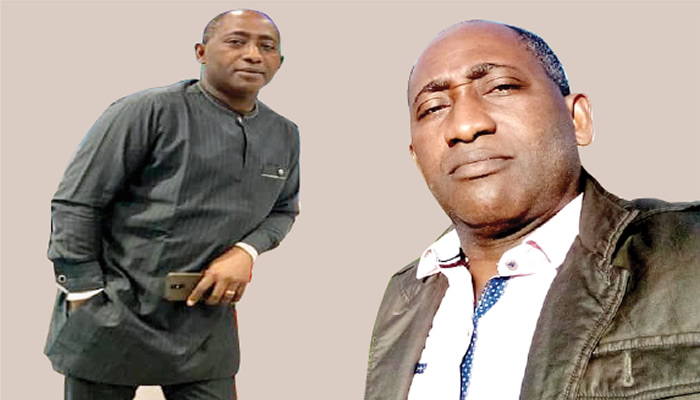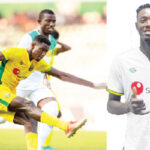
Sports broadcaster Deji Omotoyinbo talks about his passion for sports journalism, how he dumped a well-paying oil job for sports broadcasting, and more in this interview with ANTHONY NLEBEM
Were you involved in any sports while in school?
I played football in primary school and secondary school, I also played cricket and volleyball. I was not in the football school team but my classmates told me I was a decent footballer. I was majorly the chief supporter of the football team at government college Ibadan but I also played football decently, played a bit for the University of Ibadan, and was part of my NYSC team when I served and we reached the national quarterfinals.There is the saying that if you can’t make it as a professional sportsman, the next thing is to go to the media; maybe I fall into that category.
Were you passionate about football growing up?
Oh yes, I come from a family of football lovers, my father did a course in England sometime in the 1960s and became a Manchester United fan and all his three sons became United fans. I have been a United fan since the 1970s. Football was always what we had passion for, I remember my dad telling the story of the last time he watched the Nigerian football team when we lost to Ghana 7-0 and he stopped watching football because of that, but me and two other brothers up till date we are real sports fans and we discuss a lot of sport.
What influenced your decision to take a career in journalism?
When I was growing up in Ibadan in the 1970s, one big influence was the late Fabio Olanipekun who used to have a sports show on NTA Ibadan in the late 1960s and early 1970s on a Saturday evening. He was a huge influence and I was very privileged to work closely with him on several projects. By the time I started my career, he had retired and was my special guest at my book launch in 2016. We had a close relationship before he died.
Do you have any regrets about not playing football professionally?
I saw football more like a recreational sport, I never really had the intention to play it professionally. While we were growing up, it was about taking our education seriously and getting our certificate and that is what I will still suggest. Even if you are playing football, you should get an education, it’s always a fallback option. I enjoyed playing football but was not interested in taking it as a career. My late partner, Deji Tinubu, when went to school in Birmingham and was a decent footballer as well in school, but I can say that I was a better footballer than him in school, but when he got to the UK, Birmingham City offered him schoolboy form, but his father who was a school principal at that time said he did not send him to England to play football.
Your style of broadcasting is unique. How were you able to do this?
It’s like you finding what you are best at or finding your purpose, it’s something that came naturally to me, sports presentation, production, anything sports content and analysis comes naturally to me, even before I became a broadcaster.
Even during my school days, I discuss football tactics with my classmates and it is just a natural flair. I have an older brother who is a pastor and a medical doctor as well, also a mentor of mine; he was the one that advised me to make a profession in sports journalism having noticed the passion I have for it.
At one time, I was working in the oil industry, I was well paid, but not happy doing the job, I was really very miserable because of the conditions around the job. My elder brother told me that if I don’t do what I love and have passion for, I might live my entire life wondering what might have been and I don’t want to happen to me, so quit my oil job and give it a trial, I have always felt like becoming a broadcaster, I remember when I was a young boy, I used to lock myself in the toilet and read the back pages like I was broadcasting. I think sports journalism is what God ordained for me and I have found a way to navigate myself even though I diverted to other things, I still navigated myself back to it, I am glad I made the switch and have no regrets.
Has it been easy remaining one of the best sports broadcasters in Nigeria?
It takes a lot of hard work, like I said earlier, you must have passion for what you do, else, you will be motivated by what you want to gain. November 2022, was 20 years on air when we started our radio show. I live in Magodo, the show has always been on the Island, first Victoria Island, then moved to Ikoyi, for like 15 years, I did the show every day, apart from the time I was out of the country, I never missed a show and it’s a live show, even during Covid, we aired live, so if you do not have the passion, you can’t go on. I will say that it’s a question of passion, commitment, dedication and consistency to your craft and also the Grace of God. There is no shortcut to success; it’s a process in any field. I am really humbled that I have been able to stay at the top for so long with all sense of humility and still there making things happen. This is my 30th year of being on air, the first time I was on air was in 1993 on Larry Izamoje’s show in OGBC, Abeokuta, Ogun state, and Larry is the first person that put me on air.
In the 80s and 90s, Nigerian football was top-notch with players discovered from our local leagues, but that has changed. What do you think is the cause?
I have a theory for that and that is, before now, our players were playing locally and were not qualifying for the World Cup, we were qualifying for the Africa Cup of nations, and our eyes were on the local league. I grew up in Ibadan watching Segun Odegbaami, Mudal Lawal with Leventis United, Shooting Stars, and Bendel insurance. Those are the teams that we watched in Ibadan growing up, but the success of the 1994 team distracted us from the local league when Nigeria won the AFCON and qualified for the World Cups and Nigerian players got signed to play for the big teams in Europe. We had Kanu Nwankwo and Finidi George play for Ajax and our players were playing in the Italian topflight league, our eyes just followed these players in Europe and got interested in how they were doing every week and that coincided when the English Premier League was introduced. Also, the poor quality of football administration locally contributed to that, the standard of football fell and of course, the hooliganism, and lack of security in our matches contributed. I honestly feel that the 1994 team played in Europe and we followed them there and that reduced interest in the local league.





